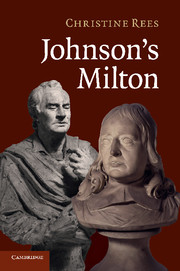Book contents
- Frontmatter
- Contents
- Acknowledgements
- List of abbreviations
- Introduction: Johnson and Milton
- PART I JOHNSON THE READER/WRITER: APPROPRIATING MILTON'S TEXTS
- PART II JOHNSON THE CRITIC: ASSESSING MILTON'S ACHIEVEMENT
- 5 ‘Phantoms which cannot be wounded’: the Lauder affair
- 6 Cutting a Colossus: Johnson's criticism of Paradise Lost
- 7 Cherry-stones: Johnson on Milton's shorter poems
- PART III JOHNSON THE BIOGRAPHER: CONSTRUCTING MILTON'S CHARACTER
- Notes
- Select bibliography
- Index
5 - ‘Phantoms which cannot be wounded’: the Lauder affair
Published online by Cambridge University Press: 05 October 2010
- Frontmatter
- Contents
- Acknowledgements
- List of abbreviations
- Introduction: Johnson and Milton
- PART I JOHNSON THE READER/WRITER: APPROPRIATING MILTON'S TEXTS
- PART II JOHNSON THE CRITIC: ASSESSING MILTON'S ACHIEVEMENT
- 5 ‘Phantoms which cannot be wounded’: the Lauder affair
- 6 Cutting a Colossus: Johnson's criticism of Paradise Lost
- 7 Cherry-stones: Johnson on Milton's shorter poems
- PART III JOHNSON THE BIOGRAPHER: CONSTRUCTING MILTON'S CHARACTER
- Notes
- Select bibliography
- Index
Summary
Johnson's known critical engagement with Milton might be said to begin at Oxford, when as an undergraduate he translated the accolade of another great English poet and critic who was to influence his thinking and literary taste. In his epigram on Milton for the significantly dated 1688 edition of Paradise Lost, John Dryden had set a benchmark for his eighteenth-century successors, combining patriotism and classicism:
Three Poets, in three distant Ages born,
Greece, Italy, and England did adorn.
The First in loftiness of thought Surpass'd;
The Next in Majesty; in both the Last.
The force of Nature cou'd no farther goe:
To make a Third she joyned the former two.
The comparison between Paradise Lost and ancient epic, initiated by Milton himself, was to become a staple of Milton criticism; Dryden puts it more succinctly and elegantly than most, and perhaps it was that epigrammatic elegance that appealed to the young Johnson. His own rendering has been both praised and criticised. Johnson himself not only retained it in his capacious memory, but quoted it to Boswell many years later in another university city, Aberdeen (Life V. p. 86). At the very least, this implies that he does not object to Dryden's tribute to Milton's exalted status among English poets. Yet his first significant intervention in the scholarly industry that had grown up around Paradise Lost by the time he was middle-aged is linked to a blatant attempt to destroy that status, to topple Milton from his pedestal as ‘the BRITISH HOMER’.
- Type
- Chapter
- Information
- Johnson's Milton , pp. 97 - 107Publisher: Cambridge University PressPrint publication year: 2010



